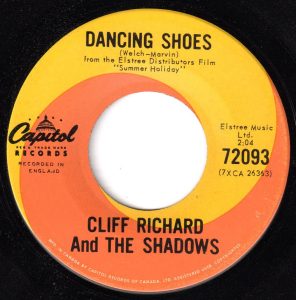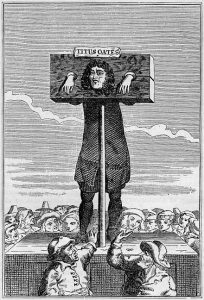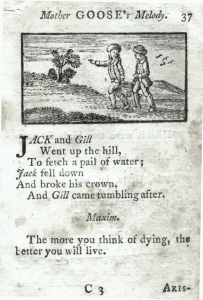#78: Dancing Shoes by Cliff Richard
Peak Month: October-November 1963
11 weeks on Vancouver’s CFUN Chart
Peak Position #1
Peak Position on Billboard Hot 100 ~ did not chart
YouTube.com: “Dancing Shoes”
Lyrics: “Dancing Shoes”
Cliff Richard was born Harry Roger Webb on October 14, 1940, in the city of Lucknow in Uttar Pradesh, India. In 1940 Lucknow was part of the British Raj, as India was not yet an independent country. Webb’s father worked on as a catering manager for the Indian Railways. His mother raised Harry and his three sisters. In 1948, when India had become independent, the Webb family took a boat to Essex, England, and began a new chapter. At the age of 16 Harry Webb was given a guitar by his father. Harry then formed a vocal group called the Quintones. Webb was interested in skiffle music, a type of jug band music, popularized by “The King of Skiffle,” Scottish singer Lonnie Donegan who had an international hit in 1955 called “Rock Island Line”.
In 1958 Webb became the lead singer of a British rock group named the Drifters. It was during this time that Harry Greatorex, who was promoting the band, gave Harry Webb the stage name, “Cliff Richard.”As rock and roll made some people think of rocks, Greatorex reasoned that “Cliff” would be a rock solid name for the young 18 year old Harry Webb. Cliff Richard would go on to record nearly 150 singles that made it onto the UK charts. While his popularity in the USA was erratic, he was a big seller in Vancouver. On this survey of 1,410 songs he appears on 22 occasions.
Bruce Welch was born in 1941 in Bognor Regis, a seaside resort 55 miles southwest of London. He formed The Railroaders while he was still fourteen (before he turned 15 on November 2, 1956). His friend, Hank Marvin was one of the other three bandmates in The Drifters. Another member of The Drifters was Terrance “Jet” Harris, who was born in North West London in 1939. It was Harris who suggested to Cliff Richard that the band change their name to The Shadows in order to avoid confusion with the American R&B group, The Drifters, who were had a string of hit records beginning with “Money Honey” in 1953 and most recently with “There Goes My Baby” in 1959.
Cliff Richard had his first single on the Vancouver charts peak at number one in the fall of 1959. “Living Doll” became an auspicious beginning for a recording artist. Fans in Vancouver were wild about Richards. He had a string of hits between 1959 and 1966, and again in the late 70s onward. Of 26 singles that charted on the Vancouver pop charts, only two didn’t climb into the Top 20.
In March 1961, Cliff Richard had his second number one hit record in Vancouver with “‘D’ In Love”. And in the spring of ’61 Richard was back in the Top Ten with “Theme For A Dream“. Eleven months later he was back in the Top Ten in Vancouver with “The Young Ones“.
And a year later Cliff Richard was roaring up the C-FUNTASTIC FIFTY in early spring 1963 with “Bachelor Boy”. From March 1963 to May 1966 Cliff Richard had 15 hit singles in the Top 20 on CFUN. Of these 12 made the Top Ten and three peaked at #1. After “Bachelor Boy”, Richard’s sixth Top Ten charting song in Vancouver was “Summer Holiday”, in May ’63. The songs overlapped with “Summer Holiday” entering the Top Ten on the C-FUNTASTIC FIFTY on April 27th at #10, while “Bachelor Boy” peaked at #5 that week. And with “Bachelor Boy”, Cliff Richard began charting for 81 of 85 consecutive weeks on the CFUNTASTIC FIFTY between March 9, 1963, and October 17, 1964.
In 1963 Richard won the Best UK Male Singer in the NME (New Musical Express) Reader Poll. In Vancouver, Cliff Richard’s follow up hit to “Summer Holiday” was “Lucky Lips” and simultaneously “It’ll Be Me”. This was a #2 hit in the UK in 1962 and #7 in Vancouver in August ’63. While “Lucky Lips” climbed to #1 in Vancouver and #4 in the UK in the summer of ’63. Of the next eight singles after “It’ll Be Me”, seven made the Top Ten in Vancouver. One of these was “The Next Time”, and another was “Dancing Shoes”.

“Dancing Shoes” was a song featured in the Cliff Richard film Summer Holiday. In the film Cliff Richard is singing to a Yugoslavian maiden who is startled by the foreigners who are gallivanting in a cornfield. In the song Cliff Richard sings about Little Bo Peep. She was sad when she lost her sheep. So Cliff Richard told her to put on her dancing shoes, “and dance away your blues.” Similarly, Richard tells his audience that Humpty Dumpty was a “friend of mine” who fell off a wall. While Humpty Dumpty is lying on the ground in pieces, Cliff Richard tole him the solution to his predicament was to “put on your dancing shoes.” And Cliff Richard tells us he also knows Jack and Jill from Mother Goose nursery rhymes. After Jack falls down and breaks his crown, and Jill comes tumbling after, Richard tells them to “put on your dancing shoes.” There is no end to other potential subsequent verses – Little Miss Muffet who was frightened away by a spider who sat down beside her, could have put on her dancing shoes to shrug off her encounter with the spider. etc.
The earliest record of Little Bo Peep is found in a manuscript dated 1805. It contains only the first verse which references the adult Bo Peep , called ‘Little’ because she was short and not because she was young. There are references to a children’s game called “bo-peep”, from the 16th century, including one in Shakespeare’s King Lear (Act I Scene iv), for which bo-peep” is thought to refer to the children’s game of peek-a-boo, but there’s no evidence that the rhyme existed earlier than the 18th century. The additional verses are first recorded in the earliest printed version in a version of Gammer Gurton’s Garland or The Nursery Parnassus in 1810, published in London by Joseph Johnson. The phrase “to play bo peep” was in use from the 14th century to refer to the punishment of being stood in a pillory. For example, in 1364, an ale-wife, Alice Causton, was convicted of giving short measure, for which crime she had to “play bo peep thorowe a pillery.”

Above, 17th century perjurer in a pillory
Humpty Dumpty was the man who was egg shaped. In Lewis Carroll’s Through The Looking Glass, Alice in Wonderland meets Humpty Dumpty. Carroll writes: HOWEVER, the egg only got larger and larger, and more and more human: when she had come within a few yards of it, she saw that it had eyes and a nose and mouth; and, when she had come close to it, she saw clearly that it was HUMPTY DUMPTY himself. ‘It can’t be anybody else!’ she said to herself.” ‘And how exactly like an egg he is!’ she said aloud, standing with her hands ready to catch him, for she was every moment expecting him to fall. ‘It’s very provoking,’ Humpty Dumpty said after a long silence, looking away from Alice as he spoke, ‘to be called an egg — very!’ ‘I said you looked like an egg, Sir,’ Alice gently explained.
Alice…softly repeated to herself:
‘Humpty Dumpty sat on a wall:
Humpty Dumpty had a great fall.
All the King’s horses and all the King’s men
Couldn’t put Humpty Dumpty in his place again.‘
Later in his conversation Lewis Carroll writes:
“When I use a word,” Humpty Dumpty said in a rather scornful tone, “it means just what I choose it to mean – neither more nor less.” And in “I Am The Walrus” John Lennon is asking ‘what is the meaning of meaning’? Ironically, Lewis Carroll’s Humpty Dumpty – who gets to decide what a word means whenever he uses it – crashes to the ground, breaking into pieces, just after Alice in Wonderland walks away.
The reference to Jack and Jill in “Dancing Shoes” is to the 17th century English nursery rhyme “Jack and Gill.” The rhyming of “water” with “after” is distinctive of the 17th century. Jill was originally spelled Gill in the earliest version of the rhyme and the accompanying woodcut showed two boys at the foot of the hill.
Jack and Gill went up the hill
To fetch a pail of water;
Jack fell down and broke his crown
And Gill came tumbling after.
Later the spelling was changed to Jill and more verses were added to carry the story further, of which the commonest are:
Up Jack got and home did trot,
As fast as he could caper;
Went to bed to mend his head
With vinegar and brown paper.Jill came in and she did grin
To see his paper plaster;
Mother, vex’d, did whip her next
For causing Jack’s disaster.
“Dancing Shoes peaked at #1 in Toronto in May 1963, while it peaked at #1 in Vancouver in October and November ’63. It climbed to #3 in Sydney (AU) and Melbourne (AU), and #9 in Stockholm, Sweden.
The liner notes for the Summer Holiday Soundtrack album featuring “Dancing Shoes” stated: “Not so very long ago, the India-born Mr. Richard was a modestly paid credit control clerk in a London television manufactory, operating under the real name of Harry Webb…. The fifties were drawing to a close and there seemed little in Harry Webb’s background to prepare him for any career beyond the world of white-collar and paper-clips. True, he had been a champion javelin-thrower in high school, and had appeared in a few amateur musical productions, but such attainments are not as readily negotiable as one might wish.” The notes chronicle the attention he gained as a skiffle performer, and getting to perform “Living Doll” for the Royal Family in 1959. The 1963 release of Summer Holiday, “caused riots at its premiere in Leicester Square…” in London.
After “Dancing Shoes”, Cliff Richard had another big hit with a cover of the Tommy Edwards song “It’s All In The Game”. Another Top Ten hit for the singer in Vancouver was “Don’t Talk To Him”, which began to chart on CFUN in Vancouver on January 11, 1964. Other hits in Vancouver for Cliff Richard in 1964 were “Constantly [L’Edera]“/”True True Lovin'” and “I’m The Lonely One“. The last of Cliff Richard’s eight consecutive Top ten hits in Vancouver was in the fall of 1964 with “On The Beach”.
Cliff Richard also had a Top Ten hit in Vancouver in 1965 with “Just Another Guy“, while the B-side “The Minute You’re Gone” stalled at #11. Then in 1966 Richard was back in the Top Ten with a cover of the Rolling Stones “Blue Turns To Grey“. While “I Don’t Wanna Love You” stalled at #14 in 1965.
In the UK Cliff Richard had 26 of his first 28 singles, from 1958 reach the Top Ten, which included a record of 23 Top Ten singles in a row, ending in the middle of 1965. Of these 15 singles were non-album singles. It would seem with the coming of the British Invasion that Cliff Richard would be discovered by the American record-buying public. However, it was not to be. He remained almost completely off the radar in the USA until his Top Ten hit in 1976 on the Billboard Hot 100 called “Devil Woman.”
He scored again in 1979 with “We Don’t Talk Anymore”. That same year he had a #4 hit in the UK, Ireland, New Zealand and South Africa with “Carrie”. And in 1980, Cliff Richard and Olivia Newton-John recorded “Suddenly”, a Top Ten hit in Ireland. At the end of the year Cliff Richard charted “Dreamin'”.
Richard’s next single was “A Little In Love”. In the fall of 1981 Cliff Richard had a Top Ten hit in Vancouver titled “Wired For Sound”. In 1982, he covered the 1961 doo-wop classic “Daddy’s Home” by Shep and the Limelights. The single was a Top Ten hit in Australia, Belgium, Ireland, New Zealand, and the UK.
In 1982 Richard released a contemporary/Christian album Now You See Me, Now You Don’t. The debut single, “The Only Way Out”, was a Top Ten hit in the Belgium, Ireland and the UK. In 1983 Cliff Richard and Phil Everly recorded a duet, “She Means Nothing To Me”, which was a Top Ten hit in Ireland and the UK. Richard also enjoyed a second Top Ten hit in both nations that year with his cover of the Buddy Holly tune “True Love Ways”. And an album marking his 25 years as a recording artist, Silver, featured a third Top Ten hit in Ireland and the UK in 1983 titled Please Don’t Fall in Love”.
In 1986, Cliff Richard released a new recording of his 1959 hit “Living Doll”. It became a number-one hit this time in Australia, Belgium, Ireland, the Netherlands, New Zealand, and the UK. As well, it made the Top Ten in Switzerland and Norway. And in 1986, Richard recorded a duet with Sarah Brightman titled “All I Ask of You”. It was a chart-topper in Ireland and South Africa, and a #3 hit in the UK.
During the 1980s, Cliff Richard had three number-one hits and 17 Top Ten hits in Ireland, and two number-one hits and 14 Top Ten hits in the UK. He had six Top Ten hits in Belgium and five Top Ten hits in Australia, with a #1 hit in each nation across the ’80s. And in the 1990s, Cliff Richard had 7 more Top Ten hits in the UK with “Savior’s Day” and “The Millennium Prayer” both topping the UK charts. And in the 2000s, the singer had five more Top Ten hits in the UK.
Cliff Richard was among the performers at the Diamond Jubilee concert held outside Buckingham Palace in June 2012. Then, on June 30, 2012, he helped to carry the Olympic torch from Derby to Birmingham as part of the torch relay for the 2012 Summer Olympics in London. Cliff Richard has also been active as a philanthropist. In October 2015 he went on tour at the age of 75. Over the course of his recording career, Cliff Richard has had 68 singles reach the Top Ten on the UK singles chart between 1958 and 2008.
In late June and early July, 2019, Cliff Richard celebrated his 60th year as a recording artist with his Diamond Encore Tour. He performed in the village of Cartmel in Cumbria, just south of Scotland. He gave a concert in Scarborough by the North Sea, and in Greenwich, London.
January 18, 2023
Ray McGinnis
References:
“Cliff’s Career,” Cliff Richard.org.
“Cliff Richard UK Singles chart discography,” official charts.com.
“Bruce Welch,” Wikipedia.org.
Bob Stanley, “Cult heroes: Alan Tarney, the greatest British pop producer you’ve never heard of,” Guardian, September 30, 2015.
Lewis Carroll, Through The Looking Glass, Chapter Six, 1872.
“C-FUNTASTIC FIFTY,” CFUN 1410 AM, Vancouver, BC, November 2, 1963.
For more song reviews visit the Countdown.


Just an editing issue for you. Right at the beginning bio of Cliff Richard you have a line section “At the age of 16 Harry Webb was given– etc. That line is repeated again just after the bio of Bruce Welch. I don’t know if that was your intention, but I thought you should know. Love and respect your work. Keep on truckin’ / Jack
Hi Jack,
Thanks for spotting the unintended repetition of the sentence.
Got it!
Best,
Ray